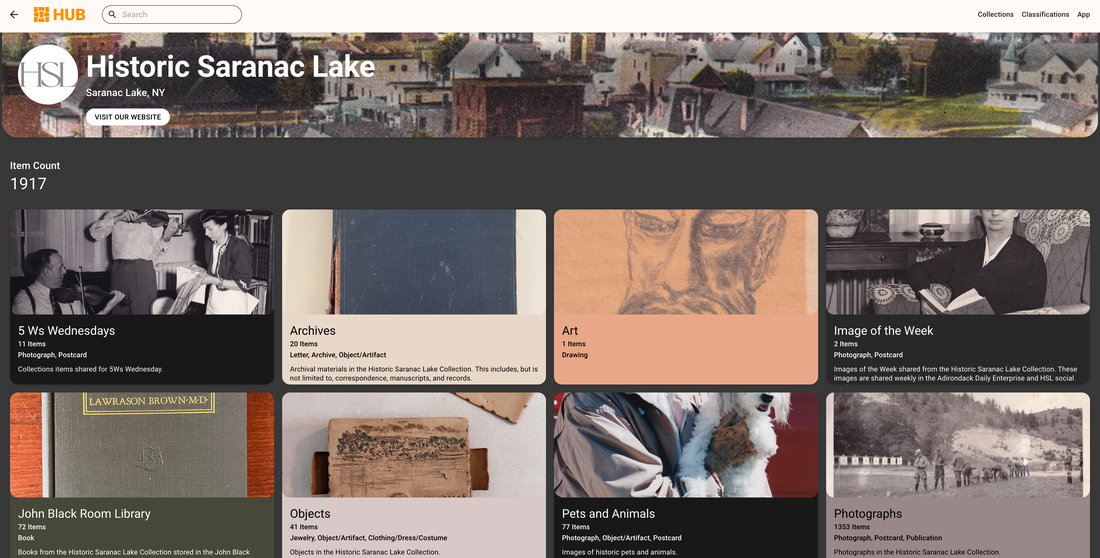ACCESS THE COLLECTIONS IN PERSONHistoric Saranac Lake is committed to providing the public access to its collections to engage visitors and encourage learning and research. The collections are available for use for all interested parties, and all researchers will be allowed equal access. Appointments must be made through the Museum Administrator, and may be made by phone, email, or in person year-round.
All researchers must provide proof of identity and complete researcher registration forms (except in the case of items in the Education Collection). All access must be supervised by a staff member at all times. All researchers will be required to follow “Researcher Rules” as provided by HSL staff. Access may be limited in rare cases where use of objects might risk significant damage, if information is restricted by donor or by law, or if staff is not available to supervise use. Staff may also refuse access to individuals who have demonstrated a lack of care for or improper handling of collections objects in the past. Staff must treat donor contact information as confidential, but information about an object's history, including donor, creator, or provenance information will be made available to researchers. Photography is allowed in exhibits and when using collections for personal reference, but all scanning and photography for publication or other official uses must be done by a staff member. Collections may be used for nonprofit and scholarly work, but commercial use must be approved by the Collections Committee and may incur a fee based on the proposed use. |
Explore our online collections database
This is not a complete list of all of the items in our collection; more records are being added every day!
MAKE A RESEARCH REQUEST ONLINECan't find what you're looking for? Want to use an image? Send us a message!
|
Access to Medical Records
The Health Insurance Portability and Accountability Act (HIPAA) of 1996 governs access to medical records, including those created before the act went into effect. In April 2003, the Privacy Rule [45 CFR 160; 140] of HIPAA went into effect; this mandates that all records containing Personal Health Information (PHI) be restricted until 50 years after the death of the individual. While Historic Saranac Lake is not a covered entity under HIPAA and therefore not subject to its regulations, we recognize that many of our records about tuberculosis patients in Saranac Lake may contain sensitive medical information. We do not share medical documents containing PHI online unless the date of the individual’s death is known, and even in those cases we may redact some information as deemed necessary by staff. Family members of patients may have access to records remotely and in person upon request. We reserve the right to restrict access to documents with PHI for requests made by non-family members or for persons whom the date of death is not known. These requests will be reviewed on a case-by-case basis. If you feel that PHI about a family member has been shared publicly in error, please contact us and we will review the information.
The Health Insurance Portability and Accountability Act (HIPAA) of 1996 governs access to medical records, including those created before the act went into effect. In April 2003, the Privacy Rule [45 CFR 160; 140] of HIPAA went into effect; this mandates that all records containing Personal Health Information (PHI) be restricted until 50 years after the death of the individual. While Historic Saranac Lake is not a covered entity under HIPAA and therefore not subject to its regulations, we recognize that many of our records about tuberculosis patients in Saranac Lake may contain sensitive medical information. We do not share medical documents containing PHI online unless the date of the individual’s death is known, and even in those cases we may redact some information as deemed necessary by staff. Family members of patients may have access to records remotely and in person upon request. We reserve the right to restrict access to documents with PHI for requests made by non-family members or for persons whom the date of death is not known. These requests will be reviewed on a case-by-case basis. If you feel that PHI about a family member has been shared publicly in error, please contact us and we will review the information.

